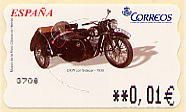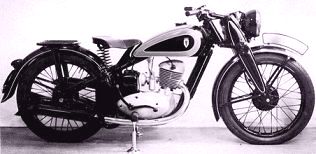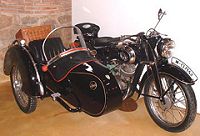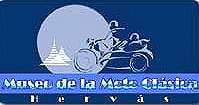| SPAIN.
Thermal ATM issues 2OO3 |
T88
(96) |
Historic
motorbikes (9).
DKW
with sidecar, 1938. Museo de la Moto Clasica de Hervas |
 |
|
Date
of issue :
|
|
October 2003 (1st.
date : / Phil. Serv. 29.10.03) |
|
|
|
47 x 27 mm.
- Format type 4 |
|
Paper
:
|
|
Thermal phosphorescent
self adhesive |
| Printing
process : |
|
Offset 4 colours, Pantone
541, invisible ink |
|
Imprint
:
|
|
Thermal on
black |
| Imprint
varieties : |
|
5 (Epelsa
5 and 4 digits small and large, Epelsa LF) |
|
|
|
0,01
€ to 99,99 € / Set Ph.S.: 0,26-0,51-0,76 € |
|
Design
and printer :
|
|
SIGNE, S.A. |
|
Printing
:
|
|
|
|
| Click
on the image to enlarge it |
| DKW
(Dampf Kraft Wagen) was founded in 1919 in Zschopau
(Germany) by the Danish Jørgen Skafte Rasmussen.
Beginning with a simple motor
attached to a bicycle, DKW produced reliable two stroke machines.
By the 1930s, DKW was the world's largest motorcycle manufacturer.
DKW became involved
in the war effort in Germany during World War II. |
 |
|
|
 |
After
the war DKW reintroduced the RT125 motorcycle. This model
was freely copied by such famous motorcycle manufacturers as Yamaha,
Harley-Davidson and BSA.
The 250 cc. models were manufactured
from 1935 and obtained great success in different Championship
Races in 1938 and 1939.
DKW KS-250 |
|
|
During the 1950s the
sales of DKW motorcycles slumped and the company eventually went
out of business in the 1960s. However, the sections of DKW
which remained in East Germany after WWII manufactured motorcycles
under the name MZ (Motorrader Zschopau). After the reunification
of Germany in 1990 the company changed its name to MuZ
(Motorrad und Zweiradwerk Gmbh).
 |
The ATM
show the image of a motorbike in the Museo de la Moto Clasica (MMC)
de
Hervas
(Caceres) - Classic Motorbike Museum in Hervas, Caceres, Spain. |
 |
|